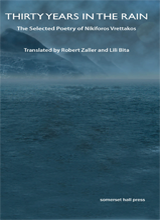Nikiforos Vrettakos - Thirty Years in the Rain. Reviewed by George Economou
From World Literature Today (September-December 2005)
Of the stellar generation of Greek poets who emerged in the 1930s, the three with the highest international visibility have been the two Nobel Prize-winners, George Seferis (1963) and Odysseus Elytis (1979), and Yannis Ritsos, who received the Lenin Prize in 1977. Much of their work has been widely translated into English in anthologies and journals as well as in book form, while the poetry of their distinguished contemporary, Nikiforos Vrettakos, who died in 1991, has been translated into numerous foreign languages but has appeared only occasionally and sparsely in English. The publication of the sixty-six poems in Thirty Years in the Rain constitutes a corrective first step in the right direction.
Credit for this remedy must go to Robert Zaller and Lili Bita, two poets whose combined English-Greek, Greek-English bilingualism has provided a special dimension to their collaborative task of translating Vrettakos. Add their years of experience as writers and translators and their comprehensive grasp of Greek literature to the mix, and the result is a work that fails to satisfy in one respect only: the wish that their book would be at least twice as long as it is. Making a fully representative selection of poems for a volume of this length from the rich and diverse life’s work of a prolific poet like Vrettakos would be very difficult, if not impossible, and Zaller and Bita have widely chosen to focus mainly upon the shorter, intensely personal lyrics and to take a pass on such longer poems as the relentless outpouring of moral and religious passion of “Muddy Rivers” or the loving greeting to all the world’s poor and little people in the heartwarming “Letter to Charlie Chaplin.”
Never particularly interested in traditional forms, Vrettakos produced a remarkable body of poems, whose range of subjects is imbued with his profoundly spiritual commitment of compassion, justice, and nature and is unified by his view of poetry as civilization’s highest form of human expression. His short poem “Poetry” offers a definition of the act of writing in a way that comprises everything he ever wrote: “Poetry is: the god / who marches / toward the whole world / with outstretched arms.” As these lines announce, a Vrettakos poem originates with the poet’s desire to embrace a subject with all his being. That the poetics of this embrace call upon the poet to center the universe into himself – rather than to be its center – saves Vrettakos from becoming ensnared in the traps set by romantic solipsism, as in “An Eagle”: “Poised like an eagle, / I stand above the world / – one claw in the snow, / the other in the clouds – / immovable, white. // My head erect, a stone outcrop. // My two eyes blizzards.”
The expertly made selection of poems reflects the poet’s lifelong devotion to his calling, his beloved wife, his fellow human beings, the topographical wonders of his homeland, and his fiercely held political ideals, which ultimately transcend the governments and parties that fail them. The translators have given the Anglophone world its first ample, if partial, experience of the reach of the eloquent voice of Nikiforos Vrettakos.

